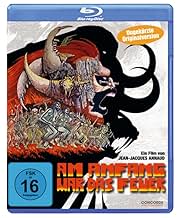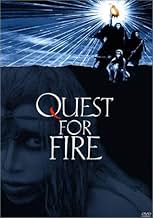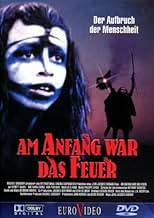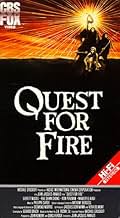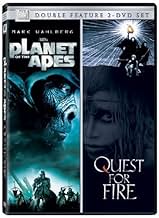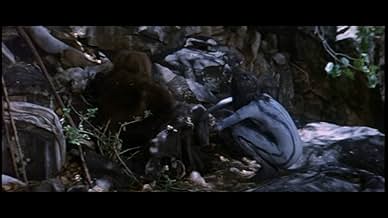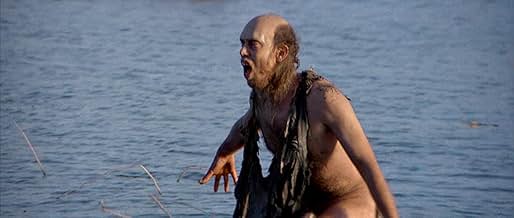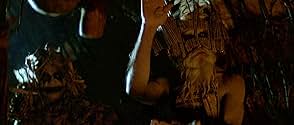Esta historia se desarrolla en tiempos prehistóricos, cuando tres miembros de una tribu buscan una nueva fuente para obtener fuego.Esta historia se desarrolla en tiempos prehistóricos, cuando tres miembros de una tribu buscan una nueva fuente para obtener fuego.Esta historia se desarrolla en tiempos prehistóricos, cuando tres miembros de una tribu buscan una nueva fuente para obtener fuego.
- Dirección
- Guionistas
- Elenco
- Ganó 1 premio Óscar
- 11 premios ganados y 8 nominaciones en total
- Gaw
- (as Nameer El-Kadi)
- Aghoo - The Ulam Tribe
- (as Frank Olivier Bonnet)
- The Ulam Tribe
- (as Joy Boushell)
- Dirección
- Guionistas
- Todo el elenco y el equipo
- Producción, taquilla y más en IMDbPro
Opiniones destacadas
There's also that overlooked moment when Naoh humbly approaches the lordly herd of marauding mastodons. Tufts of grass in hand, he bows his head in an unmistakable gesture of submission, to which the herd responds-- not very plausibly --by chasing away the attacking cannibal clan. The point here is that Naoh understands in that quiet moment that we must live humbly with those forces much greater than ourselves if we want to survive-- a possible seed of what would later become religious belief, whether in the forces of nature or in the supposed power of the supernatural.
Of course, this is all speculation. The filmmakers don't exactly hit you over the head with their messages. However, the point is that the film succeeds admirably in getting you to think about the natural history of what these lowly but momentous origins must have been like. Moreover, there are other suggestive moments, such as when the camera transitions from Rae Dawn Chong's pregnant belly to the distant full moon and humanity's far-off future. Some reviewers point out scientific flaws in the script and reject the film on that basis. But that misses the point. Of course the film is not a documentary, so no serious researcher would base a study on it. Nonetheless, the movie remains just that, a well-staged and provocative ninety minutes of unusual filmmaking. I've seen nothing like it before or since.
In this film, facial gestures, hand movements, general body language and mannerisms of the characters are all consistent with conclusions about early man, as a result of thorough anthropological research. In lieu of modern language the film's dialogue consists of some 350 invented words and sounds, also based on research. In addition, an important part of the film is attention to detail in costumes and makeup, for which the film won several awards. All of these technical cinematic elements combine to create a reasonably accurate visual and audio impression of mankind as it existed some 80,000 years ago.
As you would expect, the film is shot entirely in rugged, remote locations, resulting in landscapes that are stunningly beautiful. Background music is generally low-key and ethereal, like what you might hear in a sci-fi film. There's lots of flute sounds, which reinforce the simplicity of the time period.
For all its technical achievements, this film's main weakness may be the screenplay. When you take away the artifacts of modern life, you're very limited in the kind of story you can tell. And that clearly is the case here, with a plot that drones on with a monotony and repetition that can be tedious, and at times difficult for some viewers.
Although the story's entertainment value may be marginal, "Quest For Fire", with its low tech cinematic style, is interesting not only for its technical elements but also for its over arching theme of modern human's continuity with prehistoric man, based on the element of fire.
Later, I learned who Annaud was and admired 'The Name of the Rose' for its direction, its translation of a difficult book and its effort at realism. Finally, I rented 'Quest for Fire' on DVD and saw it on the big home screen. (In fact, I watched it several months ago and I'm commenting now because it remains in my mind.)
Experts can quibble about the realism. But for me, this film makes an intelligent and credible effort to present a world of 80,000 years ago. In this, it raises good questions about who we are as a species. Human genetic code has not changed in that time and any one of the beings portrayed would be perfectly capable of using a computer as I'm doing now. Nonetheless, they lived in a world without numbers, without prices, without trade, without written language and without means to create fire. Everyone alive today had an ancestor who survived those conditions. 'Quest for Fire' is a must-see for anyone curious about the human condition.
There's not really much of a plot--the caveman discover fire and different sexual positions--and there's no dialogue that we could understand but it didn't matter. The whole cast was excellent--especially Ron Perelman and Rae Dawn Chong (who had guts to do this). Their whole performances had to be done using some foreign language and body movement but they pulled it off. I heard Anthony Burgess was called in to develop the language used and coach the cast in how to use it. The cinematography is just breath-taking and the prehistoric animals look realistic all the way. I can't exactly say why I loved this movie but I did.
20th Century Fox deserves credit for actually acquiring the film and releasing it. Naturally it bombed badly here in the US but it seems I'm not the only one who likes it--when I mention it to friends I just get a blank look back. I haven't seen it since 1981 but it's never left me. Try to see it on a big screen TV. I give it an 8.
¿Sabías que…?
- TriviaBoth Ron Perlman and Everett McGill suffered frostbite; luckily they were able to heal completely. Despite the working conditions, they both enjoyed making the film.
- ErroresThe movie is set 80,000 years ago, and appears to show the one tribe has made pottery. Fragments of ancient pottery found in southern China date back to only 20,000 years, making them the world's oldest known pottery. However, the vessel shown is actually a dried hollow gourd.
- Citas
[first lines]
Title Card: 80,000 years ago, man's survival in a vast uncharted land depended on the possession of fire. / For those early humans, fire was an object of great mystery, since no one had mastered its creation. Fire had to be stolen from nature, it had to be kept alive - sheltered from wind and rain, guarded from rival tribes. / Fire was a symbol of power and a means of survival. The tribe who possessed fire, possessed life.
- Versiones alternativasAll UK versions are cut by 8 secs and are missing a shot of a wolf on fire.
- ConexionesFeatured in À propos de 'La guerre du feu' (1981)
Selecciones populares
- How long is Quest for Fire?Con tecnología de Alexa
Detalles
- Fecha de lanzamiento
- Países de origen
- Idiomas
- También se conoce como
- Quest for Fire
- Locaciones de filmación
- Productoras
- Ver más créditos de la compañía en IMDbPro
Taquilla
- Presupuesto
- USD 12,500,000 (estimado)
- Total en EE. UU. y Canadá
- USD 20,959,585
- Total a nivel mundial
- USD 20,962,615
- Tiempo de ejecución1 hora 40 minutos
- Color
- Relación de aspecto
- 2.35 : 1
Contribuir a esta página



![Bande-annonce [OV]](https://m.media-amazon.com/images/M/MV5BZTg3YWU0MTMtMDk1Mi00M2Y4LWFiODgtYzFhOTAyMWRjYWY2XkEyXkFqcGdeQXRyYW5zY29kZS13b3JrZmxvdw@@._V1_QL75_UY281_CR74)
